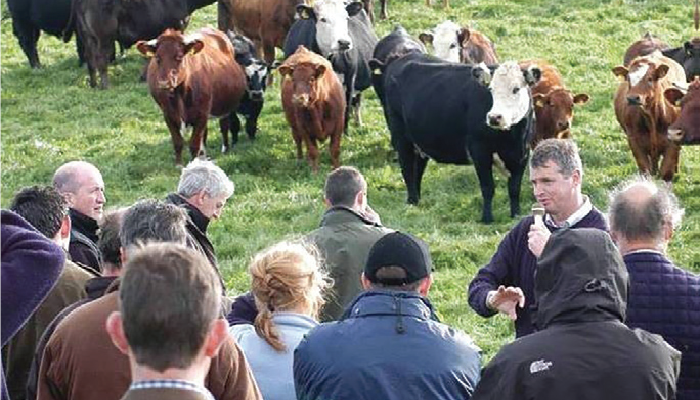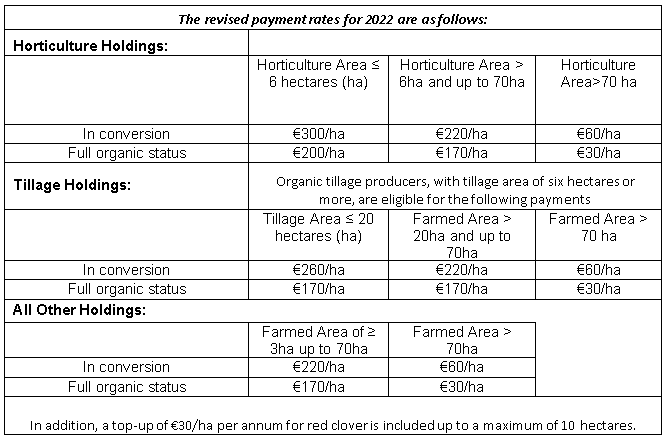02 March 2022
Could Organic Farming work on your Farm?

As CAP 2023 approaches there is going to be an increased emphasis on environmental schemes and carbon friendly farming. Organic farming is of particular interest. Eanna Loughrey, Education Officer, Teagasc Ballinrobe has information about The Organic farming scheme and webinar details here
The current EU goal is that 25% of agricultural land is organic by 2030. Currently only 8.5% of EU agriculture land is farmed organically. This leaves a huge target to be reached by 2030. At current rates of growth in the organic sector the EU looks likely to only achieve 15% to 18% of its 25% target.
Ireland’s organically farmed area is currently 1.6% of its total agricultural area. In the programme for government, its ‘’Food Vision 2030’’ aims to increase this area to 7.5% by 2030. So what does this mean for you the farmer? These targets provide comfort to farmers looking to get into organic farming as they represent a strong backing and commitment by policy makers in Ireland and the EU to the sector. Organic farming will be heavily invested in to reach these targets in the next 8 years. This is reflected in the massively increased budget of €256million for organic farming in CAP 2023 compared to €56million in the current CAP.
There are currently two schemes available to farmers engaging in organic farming: The organic capital investment scheme (OCIS) and the organic farming scheme (OFS).
The Organic Farming Scheme (OFS)
The Organic farming scheme aims to offset the costs of converting a farm to organics as well as provide a base maintenance payment to farmers engaging in organics after the conversion period. The OFS is an area based payment with two payment rates ‘’in conversion’’ and ‘’full organic status’’. Tillage holdings, Horticulture holdings and red clover swards are eligible for higher payments (see payments table below).

Applicants that are new to organic farming are eligible for a 5 year contract, the first 2 years will be paid at the ‘’in conversion rate’’ while the remaining 3 years of the contract will be paid at ‘’full organic status’’ rate. Land parcels or farms that have already been converted to organics are eligible for a 3 year contract. The opportunity to renew these contracts has in the past been given once the contract expired.
Some of the key features of the scheme are:
- Applicants must register with an organic certification body (OCB) before their application is submitted or before the commencement date of their contract
- Applicants must have an approved training course completed before the 1st November 2022
- A minimum of 3ha is required to participate in the scheme, except for horticulture producers for which the requirement is only 1ha
- A minimum stocking rate of 0.15LU/ha is required
- Where slats are being used to house animals the internal lie-back area must be equal to that of the slatted area, so 50% of the animals housing is solid floor with a suitable bedding material.
The OFS is currently open for applications. If you are interested in applying for this scheme you must apply online by the Closing Date of 8th April 2022.
The Organic Capital Investment Scheme (OCIS) is part of the TAMS II scheme. The scheme aims to provide farmers with grant aid to purchase new equipment or build new structures associated with organic farming. The rates of payment are the same as other TAMS schemes. The investment ceiling is €80,000 (ex VAT) and farmers can get 40% grant aid on their investment or 60% if they are a young trained farmer. The list of eligible equipment can be found on the department website but items of particular interest include animal housing, mowers, dung spreaders, seeders, loaders, toppers and polytunnels.
On Wednesday, 23 February, Glen Corbett, Teagasc Advisor hosted the fifth in a series of Autumn Organic Webinars which gave an insight into applying for the 2022 Organic Farming Scheme. Glen was joined by Kevin McGeever, Organic Unit, Department of Agriculture Food & the Marine (DAFM); Elaine Leavy and Joe Kelleher, Teagasc Organic Specialists.
Watch webinar recording below
Find some advice on the Steps to Organic conversion here
For more information about the Teagasc Organics Programme please visit www.teagasc.ie/organics
Or follow us on Twitter @TeagascOrganics
